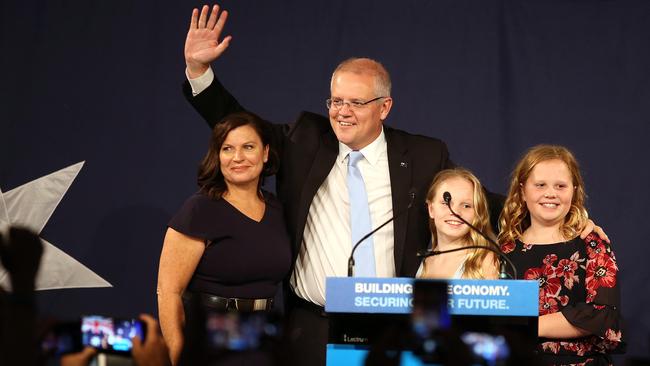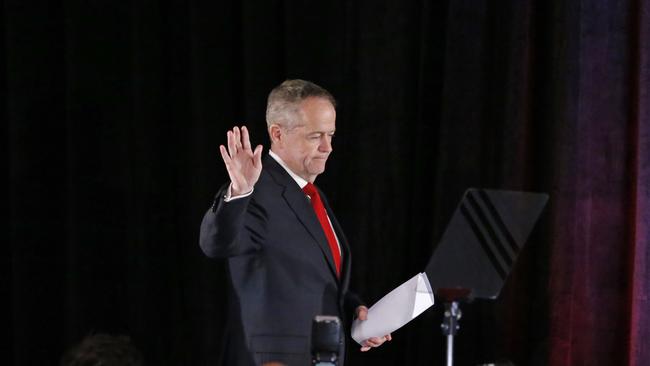Scott Morrison returns as Prime Minister of Australia
Scott Morrison declared his shock election win a “miracle” but said now the real work begins. In a win that defied the polling predictions in favour of Labor, the Coalition returned to power on the back of support in Queensland and Tasmania.
VIC News
Don't miss out on the headlines from VIC News. Followed categories will be added to My News.
Scott Morrison will lead Australia for another three years with the Coalition pulling off a miracle federal election victory.
Ahead of polling day, Labor was predicted to narrowly defeat the Coalition after consistently leading in the polls following the Liberal leadership spill.
But just nine months after being catapulted to the top job, Mr Morrison has been re-elected, meaning he will serve as Prime Minister for a longer period than Julia Gillard, Kevin Rudd, Tony Abbott or Malcolm Turnbull.
Walking into Liberal Party HQ at the Sofitel in Sydney, where cheers of “ScoMo” filled the room, the Prime Minister made his way through the electric crowd, greeting NSW Premier Gladys Berejiklian and former prime minister John Howard on the way.
As he claimed an election victory, he triumphantly declared he has always believed in miracles.
“I have always believed in miracles,” Mr Morrison said.
“How good is Australia? And how good are Australians? This is, this is, the best country in the world in which to live.
“And it’s those Australians that we have been working for for the last five-and-a-half years, since we came to Government, under Tony Abbott’s leadership back in 2013.
“It has been those Australians who have worked hard every day, they have their dreams, they have their aspirations, to get a job, to get an apprenticeship, to start a business, to meet someone amazing.
“To start a family, to buy a home, to work hard and provide the best you can for your kids. To save your retirement. And to ensure that when you’re in your retirement, that you can enjoy it because you’ve worked hard for it.
“These are the quiet Australians who have won a great victory tonight!”
SUNDAY HERALD SUN 24-PAGE ELECTION SPECIAL OUT TODAY. SUBSCRIBERS CAN DOWNLOAD HERE FROM 5AM
The Coalition entered the election without a majority after boundary changes and resignations robbed the Coalition of seats.
But strong swings in Queensland and Tasmania appear to have delivered a victory for the Morrison Government securing 74 seats compared to Labor’s 66 four hours after polls closed.
Crossbenchers were expected to pick up six seats while five were too close to call.
In a humiliating blow, former prime minister Tony Abbott was dumped by voters in his Sydney seat of Warringah, bringing to an end his 25-year political career.

But a strong swing towards the Coalition in Queensland saved Home Affairs minister Peter Dutton who was under threat in his marginal seat of Dickson.
More than 16 million voters were expected to cast a ballot in the federal election with a record 4.5 million people choosing to vote ahead of polling day.
The 2017 same-sex marriage plebiscite also boosted the youth enrolment rate with a record 1.69 million voters aged between 18 and 24 voting.

Last night the former prime minister John Howard compared Labor’s loss to that of John Hewson in 1993.
“There was a whiff of 1993 about the last couple of weeks,” Mr Howard said.
“One side have been ahead in the polls, the other had gained ground during the campaign. And I did believe very strongly that Bill Shorten had overplayed his hand on the class warfare.”
Earlier in the day, the two leaders spent the final hours of the campaign trying to lock in votes in their home states.
After a flying trip to northern Tasmania, where the Coalition was targeting the seats of Bass and Braddon, Mr Morrison jetted back to Sydney to vote with his wife Jen in his home seat of Cook.
Mr Morrison said he was energised by the five-week election campaign.
Mr Shorten started the day in his inner northwestern Melbourne suburb of Moonee Ponds voting alongside wife Chloe at a local primary school.
Mr Shorten who is unlikely to stay on as Opposition leader said he was confident Labor could win enough seats to form government.
“We’ll be ready to start straight away, and we’ll start straight away,” Mr Shorten vowed.
In a bold move, the Labor leader campaigned in the Victorian seats of Deakin and Higgins, which was held by retiring Liberal minister Kelly O’Dwyer by a margin of 7.4 per cent.
HOW SCOMO WON IT IN FINAL DAYS
Annika Smethurst Comment
IN a shock to some of his dejected colleagues, Scott Morrison campaigned until the very end.
He lapped the country and nailed attack lines until polling booths closed.
From the outside he looked like a man trying to keep his team together in the face of defeat, but his motives were far more complex.
In the final days of the campaign, Liberal pollsters reported undecided voters were more willing to vote Labor if they thought the result had already been decided.
If voters thought it would be a close race they were more likely to vote Liberal.
Morrison knew this, and he also knew that limiting the loss would give him the best chance to stay on as leader when the critics start circling.
With the Coalition on track for defeat, the Prime Minister’s team was frantically briefing that if Labor were to win 81 or 82 seats, the Coalition would give itself a “pass mark”.
In reality, that would be an incredible failure.
While the Coalition was expected to hold on to a number of marginal seats in Queensland, losing once-safe Liberal electorates in NSW and Victoria should not be viewed as a success.
Morrison cannot be held solely responsible for this result. Every member of the Liberal party room should be held to account.
Losing seats that have been in Liberal hands since Federation should be cause for concern.
MORE: WHAT THE COALITION VICTORY MEANS FOR YOU
LIBERALS PULL OFF ELECTION MIRACLE: BOLT
Much of the chaos of the past six years was justified by a need to appeal to a “base” that turned against the Liberal Party yesterday.
The only thing for the Liberal party to do is learn from Labor, which was written off for a generation after the chaos of the Rudd-Gillard-Rudd years, only to make a historic comeback.
Originally published as Scott Morrison returns as Prime Minister of Australia


